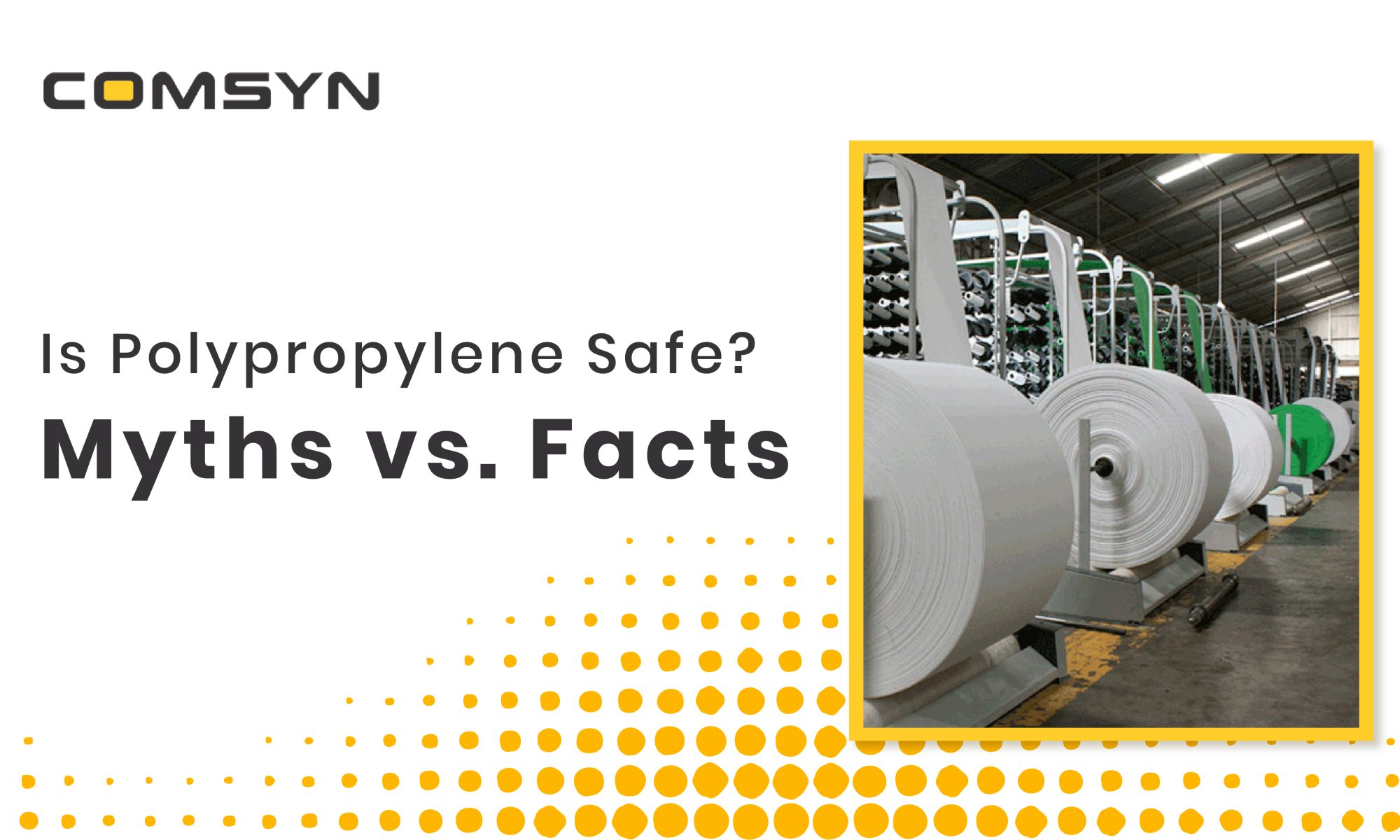This blog answers these questions by differentiating between myth and reality, thus making you realize the reasons behind polypropylene being trusted. Companies such as Comsyn play a crucial role in ensuring that polypropylene products meet the highest safety and quality considerations, thus offering peace of mind to businesses and consumers. Polypropylene is a thermoplastic polymer recognized for its outstanding balance between properties. It is light, durable, and resistant to chemicals, heat, and fatigue. The molecular structure of polypropylene permits the material to be shaped into different forms without going through degradation or change, thereby making it one of the most versatile materials for various applications. Common uses of polypropylene include: Polypropylene stands out as a nontoxic plastic able to resist mechanical stress. Unlike some other plastics, PP does not contain harmful compounds such as BPA (bisphenol A) and phthalates implicated in health problems. Because it is safe, polypropylene is an ideal material for products that come in contact with humans, such as: Comsyn takes care to ensure that the polypropylene products it manufactures are secure to the highest safety benchmarks. By investing in quality control and high-quality manufacturing, Comsyn ensures that polypropylene plastic is safe for consumers and industrial applications. A major concern is whether or not polypropylene is safe for food storage. The good news is that polypropylene is an FDA-approved plastic for food contact applications, which implies that it is safe for food contact. Its chemical resistance and low leaching characteristics ensure that there won’t be any contamination of food or drink. The biggest advantages a consumer should be looking for in polypropylene include: With all such properties, it becomes a favorable option for reusable food containers, lunch boxes, and water bottles. Comsyn does rigorous testing of its food-grade polypropylene products before marketing them. They adhere to the highest safety standards, which are a comfort for companies and consumers alike. Polypropylene opens up other benefits not restricted to something safe. With strong resistance to wear and grease, it is practical for manufacturing because it combines high tensile strength, flexibility, and chemical resistance. Polypropylene has the following benefits: Polypropylene is widely considered to be safe to use, but environmental concerns about its manufactured forms persist. Owing to the ecologically sound methods currently applied in practice, being more recyclable than other plastics makes polypropylene a green option, despite its being another polluting plastic due to mishandling. Indicators for advancement toward sustainability include: Active uses of Comsyn toward achieving sustainability in the form of the production of polypropylene products, with each aligning with the global environmental directions. Polypropylene leaps ahead of other materials like PVC, PET, or glass regarding safety and versatility. Polypropylene combines safety, durability, and economic benefits, unlike some other industrial materials. From a global perspective, safety in polypropylene is subject to stringent regulatory compliance. Important international certifications include: Comsyn has adherence to regulations, which establish that Comsyn polypropylene complies with or exceeds each of the required material standards. So is polypropylene safe? Absolutely yes. Non-toxic, resistant to chemicals, FDA approved, polypropylene is one of the currently safest plastics on offer. In food packaging as in medical applications, its versatility is perpetually stretching innovation through various industries. Comsyn is a leading polypropylene manufacturer, dedicated to delivering safe and high-quality polypropylene solutions. Whether you are in business and need reliable materials or you are a consumer seeking a safe, durable product, Comsyn guarantees high-service excellence all along the purchase path. Contact Comsyn, to learn more about all those polypropylene solutions required to meet your needs. No, polypropylene is safe, non-toxic, and widely used in food and medical applications. 2. What is the safest plastic to use? Polypropylene is one of the safest plastics, being BPA-free, durable, and FDA-approved for food contact. 3. What is the disadvantage of polypropylene? 4. Is Polypropylene BPA-Free? 5. Is polypropylene banned in India?Is Polypropylene Safe? Myths vs. Facts

Polypropylene (PP) is one of the most versatile and familiar plastics known today. The applications of polypropylene include packaging, medical devices, and household products, which makes it an indispensable plastic across industries. The increasing concerns regarding the safety of plastics often bring into our minds the question: is polypropylene safe? Questions like “Is polypropylene plastic safe” keep coming up, revealing the realization of consumers regarding its health implications, food safety, and environmental footprints.What Is Polypropylene?
Is Polypropylene Safe for Use?
Is Polypropylene Safe for Food Storage?
Advantages of Using Polypropylene
Environmental Concern regarding Polypropylene
Comparison: Polypropylene vs. Other Materials
Regulations on Polypropylene Safety
Conclusion
FAQ
1. Should I avoid polypropylene?
Polypropylene is less heat-resistant than some plastics and can degrade under UV exposure.
Yes, polypropylene is naturally BPA-free and does not contain harmful additives.
No, polypropylene is not banned in India and is commonly used across industries.
- About Us
- Products
- Markets Served
-
- Investor Relation
- Board Of Directors
- Committees Of Board
- Corporate Governance
- Financials
- Annual Report
- Key Managerial Positions
- Shareholding Pattern
- Notices
- Policies Programme
- Announcements
- Statement of Investor Complaints
- Unpaid & Unclaimed Dividend
- Prospectus
- Investors Contact
- Subsidiary Financials
- IEPF
- Preferential Issue – 2024
- MOA & AOA
- Integrated Filing
- Sustainability
- Contact Us
- TechTex
- Brochure

